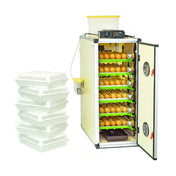Table of Contents

As a poultry farmer, the tools you use can make a big difference in the speed and quality of your work. Feather plucking machines can be essential to processing, but choosing the right type—ABS Plastic or metal—can be challenging. Each material has its strengths and weaknesses. This blog will help you weigh the pros and cons of ABS Plastic versus metal feather pluckers, so you can make the best choice for your farm.

How Does a Feather Plucker Work?
A defeathering machine is designed to remove feathers from poultry quickly and efficiently after processing. The machine typically features rotating drums lined with rubber fingers that grip and pull feathers from the bird’s skin. Whether you’re processing chickens, turkeys, or quail, the fundamental process is the same. However, the materials used in the plucker—particularly the drum and fingers—can impact the machine’s performance and longevity.

The Pros and Cons of Metal Feather Pluckers
Metal feather removal machines have been a long-standing choice for many farmers due to their strength and durability. However, these machines come with their own set of challenges.
Pros:
- Durability: Metal pluckers are generally very strong and can handle heavy-duty tasks, making them suitable for high-volume operations.
- Longevity: When well-maintained, metal pluckers can last a long time, especially if used in a dry environment.
Cons:
- Rust and Corrosion: One of the biggest downsides to metal pluckers is their ability to rust and corrode, especially in humid or wet environments. Over time, this can weaken the machine and require costly repairs or replacements.
- Weight: Metal pluckers tend to be heavier, making them harder to move around the farm and more cumbersome to operate.
- Maintenance: Metal pluckers often require more maintenance, including regular lubrication and part replacements, like belts and gears. This can add up in terms of both time and cost.

The Pros and Cons of ABS Plastic Feather Pluckers
ABS Plastic feather pluckers offer a modern alternative to traditional metal models, while addressing some of the key issues farmers face with metal machines.
Pros:
- Rust-Proof: ABS Plastic pluckers are completely resistant to rust and corrosion, making them ideal for use in wet or humid environments. This feature significantly extends the machine’s lifespan and reduces the need for maintenance.
- Lightweight: ABS Plastic pluckers are much lighter than metal ones, making them easier to maneuver and less tiring to use during long processing sessions.
- Low Maintenance: With fewer parts to replace and no need for lubrication, ABS Plastic pluckers require less upkeep, saving you time and money in the long run.
Cons:
- Durability: While ABS Plastic pluckers are durable, they may not be as ideal as metal pluckers for extremely high-volume or heavy-duty use. However, for most small to medium-sized farms, ABS Plastic pluckers provide more than enough durability.
-
Initial Skepticism: Some farmers may be skeptical about the longevity of ABS Plastic machines compared to traditional metal ones, especially if they’ve relied on metal for years. However, advancements in material technology have made ABS Plastic pluckers much more reliable than they once were.

What Makes ABS Plastic Feather Pluckers Stand Out?
When you compare ABS Plastic feather pluckers to metal ones, the benefits become clear. ABS Plastic pluckers offer significant advantages in terms of rust resistance, ease of use, and maintenance. The natural rubber fingers used in ABS Plastic models are gentle yet effective, ensuring a clean pluck without damaging the bird’s skin. Additionally, ABS Plastic pluckers still include features like built-in feather chutes, which help keep your work area clean and make the entire process more efficient.
What difference does natural rubber make for plucking? The natural rubber material grips feathers gently yet firmly, ensuring a smooth pluck without damaging the bird’s skin, which helps maintain the quality of the meat.

Hatching Time Pluckers
Both ABS Plastic and metal feather pluckers have their strengths, but your choice should depend on your specific needs. Hatching Time has great options whether you need a quail feather plucker, chicken feather plucker or even one for turkeys or geese or ducks. There are also options for processing kits that include processing cones to make sure you have everything you need.
For most farmers, ABS Plastic pluckers offer a balance of durability, ease of use, and cost-effectiveness. Partnered with I-Pluck patented technology, these hygienic ABS Plastic feather pluckers provide efficient feather removal with peace of mind. With no risk of rust, lower maintenance needs, and lightweight design, ABS Plastic feather pluckers are an excellent investment for any poultry farmer or homesteader looking to streamline their operations and reduce long-term costs








